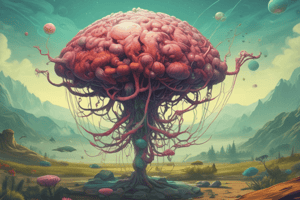Podcast
Questions and Answers
¿Cuál de las siguientes NO es una característica fundamental de la vida?
¿Cuál de las siguientes NO es una característica fundamental de la vida?
- Inmovilidad (correct)
- Organización celular
- Reproducción
- Metabolismo
¿Qué rama de la biología se enfoca en el estudio de la herencia y la variación en los seres vivos?
¿Qué rama de la biología se enfoca en el estudio de la herencia y la variación en los seres vivos?
- Ecología
- Genética (correct)
- Botánica
- Zoología
¿Cuál es el nivel de organización biológica que engloba a todos los seres vivos y sus entornos en la Tierra?
¿Cuál es el nivel de organización biológica que engloba a todos los seres vivos y sus entornos en la Tierra?
- Ecosistema
- Población
- Biosfera (correct)
- Comunidad
¿Qué proceso biológico convierte la energía lumínica en energía química?
¿Qué proceso biológico convierte la energía lumínica en energía química?
¿Cuál de las siguientes describe mejor la función de la homeostasis?
¿Cuál de las siguientes describe mejor la función de la homeostasis?
¿Qué estudia la fisiología en biología?
¿Qué estudia la fisiología en biología?
Si un biólogo estudia las interacciones entre diferentes poblaciones en un bosque, ¿en qué nivel de organización biológica se enfoca?
Si un biólogo estudia las interacciones entre diferentes poblaciones en un bosque, ¿en qué nivel de organización biológica se enfoca?
¿Cuál es la definición más precisa de metabolismo?
¿Cuál es la definición más precisa de metabolismo?
Flashcards
Biología
Biología
El estudio científico de la vida, incluyendo su estructura, función, crecimiento, origen, evolución y distribución.
Características de la vida
Características de la vida
Un conjunto de características que definen a los seres vivos, como la organización, la estructura celular, el metabolismo, el crecimiento, la adaptación, la respuesta a estímulos, la reproducción y la homeostasis.
Botánica
Botánica
Ciencia que estudia las plantas, incluyendo su estructura, función, reproducción y evolución.
Zoología
Zoología
Signup and view all the flashcards
Microbiología
Microbiología
Signup and view all the flashcards
Genética
Genética
Signup and view all the flashcards
Ecología
Ecología
Signup and view all the flashcards
Fisiología
Fisiología
Signup and view all the flashcards
Study Notes
General Concepts of Biology
- Biology is the scientific study of life, encompassing the structure, function, growth, origin, evolution, and distribution of living organisms.
- Key characteristics of life include organization, cellular structure, metabolism, growth, adaptation, response to stimuli, reproduction, and homeostasis.
- Biology is a multidisciplinary field, drawing upon chemistry, physics, and mathematics.
- Biologists utilize observation, experimentation, and modeling to study life.
Branches of Biology
- Botany: The study of plants, including their structure, function, reproduction, and evolution.
- Zoology: The study of animals, including their structure, function, reproduction, and behavior.
- Microbiology: The study of microorganisms, including bacteria, viruses, fungi, and protists.
- Genetics: The study of heredity and variation in living organisms.
- Ecology: The study of the relationships between organisms and their environment.
- Molecular Biology: The study of the structure and function of biological macromolecules, such as proteins and nucleic acids.
- Evolutionary Biology: The study of the processes that have led to the diversity of life on Earth.
- Physiology: The study of the functions of living organisms and their parts.
Levels of Biological Organization
- Organisms: Individual living entities.
- Populations: Groups of organisms of the same species interacting in a particular area.
- Communities: Various populations interacting in a particular area.
- Ecosystems: Communities of organisms interacting with their physical environment.
- Biosphere: All living organisms on Earth and the environments they occupy.
Basic Biological Processes
- Metabolism: The sum of all chemical reactions in a living organism.
- Cellular Respiration: The process cells use to extract energy from food molecules.
- Photosynthesis: The process by which plants and some other organisms convert light energy into chemical energy.
- Reproduction: The process by which organisms produce offspring.
- Growth and Development: The increase in size and complexity of an organism over time.
- Adaptation: The process by which organisms become better suited to their environment.
- Homeostasis: The maintenance of a stable internal environment.
Studying That Suits You
Use AI to generate personalized quizzes and flashcards to suit your learning preferences.




